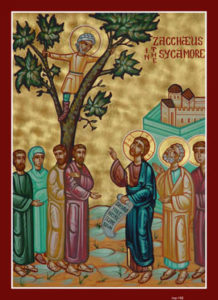Thoughts on Sunday’s Lessons for Nov. 3, 2019
(All Saints’ Day may also be celebrated on the Sunday following Nov. 1. Those Illuminations are posted separately.)
First Reading (Track One): Habakkuk 1:1-4; 2:1-4
If the name Habakkuk doesn’t seem familiar, there’s a reason for that: A reading from the book of this minor prophet happens only twice in the three-year Lectionary cycle of Sunday readings.
We hear it as the Track One first reading this Sunday, and these same verses were the Track Two first reading four weeks ago. But this short three-chapter book is unusual and fascinating. Unlike most of the prophets who heard God’s word and passed it on to humanity, Habakkuk shouts out his own warnings, then turns to God with frustration because, in his opinion, God isn’t listening. Habakkuk feels left alone without divine assistance. But now God responds, directing Habakkuk to write his vision down so clearly that a runner can read it while racing past.
First Reading (Track Two): Isaiah 1:1, 10-18
Isaiah’s great book of prophecy gets off to a fiery start. It begins with five full chapters filled with God’s angry wrath before we even get to God’s call to the prophet. First we must clearly hear God’s anger at the people’s failure to keep the covenant that their ancestors made through Moses at Mount Sinai. We hear that wrath in today’s reading, as God likens Israel to Sodom and Gomorrah. They are a people so vile that God hates them and their works. But, as always, this angry judgment is not absolute. This is the way to restore God’s love: “Cease to do evil, learn to do good; seek justice, rescue the oppressed, defend the orphan, and plead for the widow.”
Psalm (Track One): Psalm 119:137-144
We hear verses from Psalm 119 fairly often. The longest of all the Psalms, fully 176 verses long, portions of it appear a dozen times during the three-year lectionary cycle. While it offers different poetry in every section, it remains true throughout its course as a long, loving celebration of God’s teaching and law. Today’s verses may have come as good advice to those who were targeted by Habakkuk’s prophecy: When trouble and distress come on us, God’s law and teaching are our delight.
Psalm (Track Two): Psalm 32:1-8
Rebounding from the horrific notion of a God too angry to hear the people’s prayers or sacrifices, too outdone to give them even the least attention, our Psalm sings the joy that comes when the separation from God that results from sin is ended, replaced with the utter joy of knowing God’s forgiveness. No longer groaning with pain that feels like withered bones, the repentant sinner is now guarded against trouble and surrounded with shouts of deliverance.
Second Reading: 2 Thessalonians 1:1-4, 11-12
This reading begin a three-week visit with the second letter to the church of Thessalonika in Northern Greece. This letter probably came a generation after the first letter to the Thessalonians, perhaps around 100 CE, and it was probably written in Paul’s name by a follower long after his death. These early Christians were facing severe Roman persecution, and the letter opens with hearty thanks and gratitude for their steadfast faith despite all that they have had to endure.
Gospel: Luke 19:1-10
What’s this? Another tax collector? Last week we saw Jesus praising a tax collector for his humble prayer. Jesus even called a tax collector, Matthew, as one of his apostles. The Pharisees often criticized Jesus for hanging around with prostitutes and tax-collectors – the most insulting occupations they could think of. Tax collectors were despised because they traitorously sold their services to the hated Roman occupiers, extracting heavy taxes from the people, and often taking a little extra to enrich themselves. Nevertheless, here is Jesus shouting out to another tax collector – the diminutive Zacchaeus – who had climbed a tree the better to see him. Then Jesus invites himself to dinner at Zacchaeus’ house! Like the praying tax collector in last week’s Gospel, Zacchaeus earns salvation by following Jesus.

